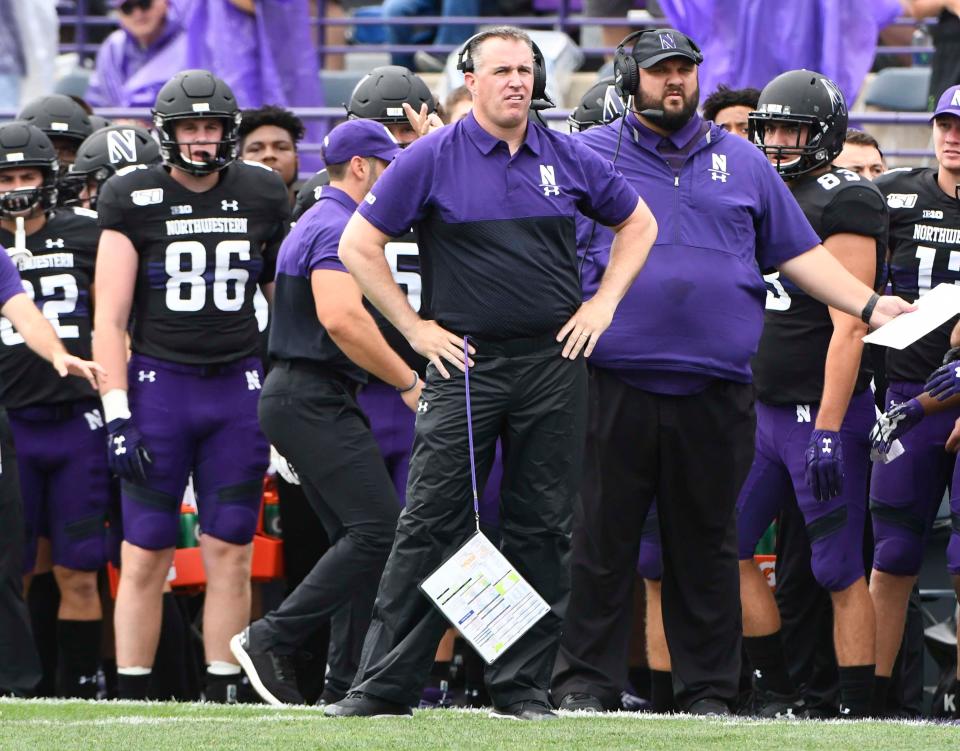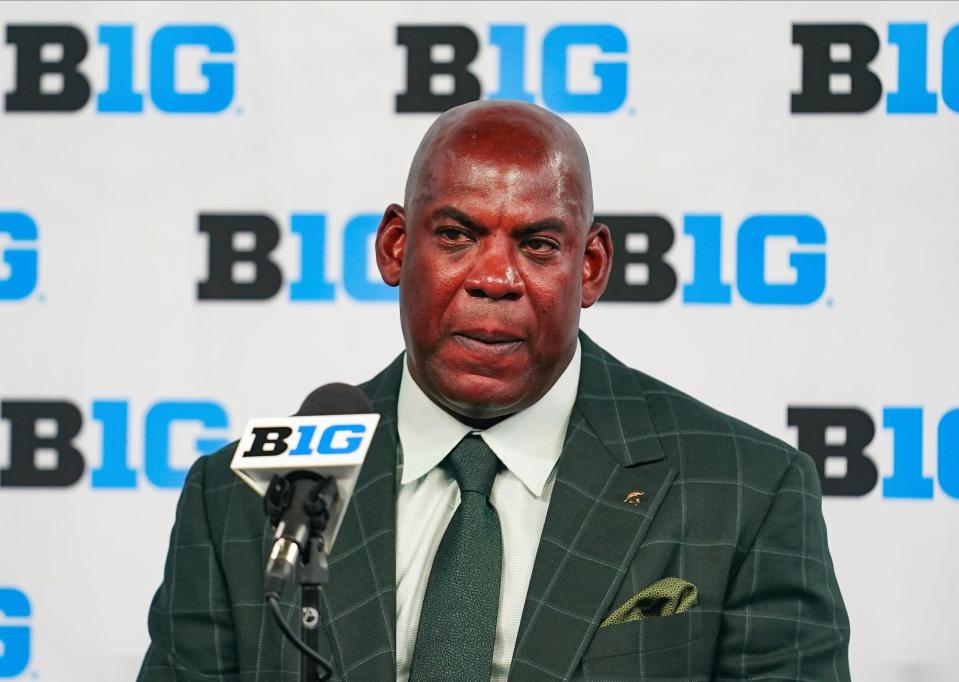Couch: Northwestern football's hazing saga is, at minimum, a lesson in failed leadership

INDIANAPOLIS – Pat Fitzgerald should have known, if he somehow didn’t. The evidence of that is most clear in conversations with other football coaches, like Michigan State’s Mel Tucker.
Two weeks after Fitzgerald was stunningly and clumsily fired by Northwestern amid allegations of rampant hazing within his football program, the rest of the Big Ten’s coaches descended on Indianapolis for Big Ten media days, sans Fitzgerald, who used to thrive at this event. He was a go-to voice for league issues, a nice guy, by my experiences, in a profession that has some jerks.
Fellow coaches and administrators are, by and large, reluctant to directly criticize the inner workings of programs that aren’t theirs. But if you talk to them about their programs, you’ll see that Fitzgerald, at the very least, was negligent in overseeing his operation, if the growing allegations are true.
For example, at MSU …
“We have a hazing policy and it wasn't like I have to double-check,” Tucker said Wednesday, ahead of his fourth season as MSU’s head coach. “We see our guys all the time. We have a large staff. And we’ve got the 10 countable coaches, but we have GAs (graduate assistants), analysts, the quality control guys, you got the Darien Harris' of the world, the operations people, you've got the equipment people, you got the nutrition people, you got the trainers, you got the strength staff, and we're surrounding these guys. So we know who we have on our team and what's going on with our players.”
The Northwestern saga — from the alleged hazing to the administrative response — is irksome on a couple levels. I have no tolerance for bullies or for people in leadership positions who fail to lead. Two major pet peeves at the heart of one scandal.
If Fitzgerald was truly in the dark, as he says, even if only about the worst of the alleged behavior — hazing in the form of harassment, coerced sexual acts and mental abuse — that’s better than being in the know, even if hard to believe based on player accounts in lawsuits and stories. Either way, he couldn’t keep leading that program.
Nor has Northwestern president Michael Schill inspired much confidence in his leadership. At the end of a six-month investigation into the football program, which reportedly found no credible evidence that Fitzgerald knew of any hazing, Schill initially suspended Fitzgerald for two weeks. Three days later, as the allegations became public after the student newspaper did some digging, Schill fired Fitzgerald.
Schill reportedly explained that he initially focused too much on the investigation's findings and not enough on what Fitzgerald should have known. There is room for one's opinion to evolve. But this seemed like a reaction to decision coming under fire.
If public pressure causes you to change course to that degree, you probably shouldn’t be running a university, even if your final decision in this case wound up being correct. The gulf between a two-week summer suspension and termination is too large to be seen as a reasonable escalation in thought. Furthermore, Schill and athletic director Derrick Gragg have been relatively invisible for much of the last two weeks. Gragg missed an opportunity to be front and center at Big Ten media days. They've been anything but inspiring as leaders.
That’s Northwestern’s problem, to be sorted out in the coming months, along with decisions about a football program that's likely headed for hard times on the field. It's a shame. Fitzgerald was Northwestern football — loyal to his alma mater, respected in his profession, about to coach his son, a freshman on Northwestern's team.
A lot's been lost. While there are Northwestern players, past and present, who should answer for alleged behaviors, there are also dozens of current Wildcat players whose college careers have just been upended. Those that stay will likely deal with another coaching change after the season, existing in a program that'll struggle to be competitive for a while. Those that leave will have their lives upended, too. This isn't fair to any of them. Nor was it far to those who were unwillingly hazed.
"Culture" is an overused term, too all-encompassing. Too vague. Too easy to criticize without really understanding. But Northwestern football appears to have had a long-running problem on that front. There's no other way to put it. This goes well beyond harmless rituals or traditions — like freshmen carrying the bags of upperclassmen on road trips, etc. Some of the accusations are disgusting. Even if no worse than what goes on at some fraternities and sororities on campuses.
RELATED: New lawsuit provides most detailed account to date of alleged Northwestern football hazing
In hindsight, you can see how this might be more likely to happen at a school like Northwestern — a private institution not subject to Freedom of Information Act inquiries, a place that can get away without some of the systematic checks you have in other athletic departments, and a football program that recruits mostly middling prospects, kids who are perhaps more likely to feel obligated to ingratiate themselves into the team culture. You know who's less likely to put up with hazing from some suburban Chicago three-star senior? A four- or five-star freshman.
That doesn’t mean hazing doesn’t happen at other places. I’m sure there are some coaches and athletic directors around the country nipping a few old traditions in the bud right now or thinking back to things that used to happen 20 years ago wherever they were coaching or playing.
But I also think these specific allegations at Northwestern are far from common nowadays.
That, too, you could sense from talking to coaches and players at Big Ten media days.
“I don’t think there was anything I was concerned about,” MSU senior receiver Tre Mosley said Wednesday. “ … Even with the previous staff, with coach (Mark) D (Dantonio), there were (older) guys on those teams. That was something they showed me — this is how you go about your business. This is the right way to do it. This is the wrong way to do it.”

Tucker said they’ll emphasize the anti-hazing policy again when MSU’s players report next week. “I think that just makes too much sense,” he said.
That policy is athletic department-wide and it’s more than a document.
“I’m constantly looking at our student-athlete environment and, whether something happens here or has happened somewhere else, I'm always looking at what ways we can improve and then also give our student-athletes an opportunity to have a voice,” MSU athletic director Alan Haller said. “Are we creating opportunities for our student-athletes to tell us about their experience?
“When I walk around, they know, that's Alan and that Alan is approachable. … That's really what all of our staff does, all of our administrators here do. Yes I like going to all of our sporting events because I'm a fan. But also I pay attention to their environments, as well.”
At the very least, at Northwestern, Fitzgerald and others up and down the chain weren’t paying attention. More likely, it seems, they just didn't see the problem.
Contact Graham Couch at gcouch@lsj.com. Follow him on Twitter @Graham_Couch.
This article originally appeared on Lansing State Journal: Northwestern football's hazing saga is a lesson in failed leadership

